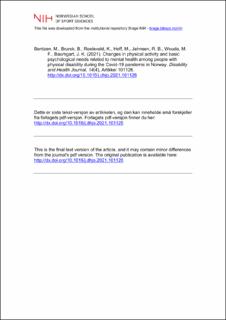| dc.contributor.author | Bentzen, Marte | |
| dc.contributor.author | Brurok, Berit | |
| dc.contributor.author | Roeleveld, Karin | |
| dc.contributor.author | Hoff, Mari | |
| dc.contributor.author | Jahnsen, Reidun | |
| dc.contributor.author | Wouda, Matthijs Ferdinand | |
| dc.contributor.author | Baumgart, Julia Kathrin | |
| dc.date.accessioned | 2022-05-11T09:28:41Z | |
| dc.date.available | 2022-05-11T09:28:41Z | |
| dc.date.created | 2021-06-10T13:55:54Z | |
| dc.date.issued | 2021 | |
| dc.identifier.citation | Disability and Health Journal. 2021, 14(4), Artikkel 101126. | en_US |
| dc.identifier.issn | 1936-6574 | |
| dc.identifier.uri | https://hdl.handle.net/11250/2995222 | |
| dc.description | Dette er siste tekst-versjon av artikkelen, og den kan inneholde små forskjeller fra forlagets pdf-versjon. Forlagets pdf-versjon finner du på sciencedirect.com / This is the final text version of the article, and it may contain minor differences from the journal's pdf version. The original publication is available at sciencedirect.com | en_US |
| dc.description.abstract | Background: People with a physical disability are more inactive than the general population. Due to the positive effects of physical activity (PA) on physical and mental health, maintaining a physically active lifestyle is important especially during challenging periods of life. Objective: Explore whether people with a physical disability experienced changes in PA, health status, and psychological need satisfaction (autonomy, competence and relatedness) during the first wave of the Covid-19 pandemic in Norway. Further, explore whether changes in psychological need satisfaction were associated with changes in PA level and mental health. Methods: Cross-sectional retrospective study using an online self-reported questionnaire after the first wave during the Covid-19 pandemic. Results: Of the 298 participants with physical disabilities (AgeM = 49yr; 62% females; 66% using mobility aids), 66% reported decreased PA compared to the same period in the previous year, 45% reported declined health status due to increased pain and reduced physical functioning. Regarding psychological need satisfaction, it was primarily the change in need for autonomy and competence for PA that were associated with change in PA and mental health. Conclusions: Most of the participants indicated decreased PA and about half decreased Health status during the Covid-19 pandemic. Further, the results indicated that it is important to nurture the basic psychological needs of autonomy and competence for PA when aiming to maintain or increase PA levels and mental health for this population living under restrictions of a pandemic. | en_US |
| dc.language.iso | eng | en_US |
| dc.subject | COVID-19 | en_US |
| dc.subject | healthcare services | en_US |
| dc.subject | physical disability | en_US |
| dc.subject | physical activity | en_US |
| dc.subject | motivation | en_US |
| dc.subject | self-determination theory | en_US |
| dc.title | Changes in physical activity and basic psychological needs related to mental health among people with physical disability during the Covid-19 pandemic in Norway | en_US |
| dc.title.alternative | Changes in physical activity and basic psychological needs related to mental health among people with physical disability during the Covid-19 pandemic in Norway | en_US |
| dc.type | Peer reviewed | en_US |
| dc.type | Journal article | en_US |
| dc.description.version | acceptedVersion | en_US |
| dc.source.pagenumber | 1-7 | en_US |
| dc.source.volume | 14 | en_US |
| dc.source.journal | Disability and Health Journal | en_US |
| dc.source.issue | 4 | en_US |
| dc.identifier.doi | 10.1016/j.dhjo.2021.101126 | |
| dc.identifier.cristin | 1915082 | |
| dc.description.localcode | Institutt for lærerutdanning og friluftslivsstudier / Department of Teacher Education and Outdoor Studies | en_US |
| cristin.ispublished | true | |
| cristin.fulltext | postprint | |
| cristin.qualitycode | 1 | |
